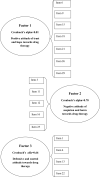Attitude Towards Drug Therapy in a Community Mental Health Center Evaluated by the Drug Attitude Inventory
- PMID: 32606616
- PMCID: PMC7307441
- DOI: 10.2147/PPA.S251993
Attitude Towards Drug Therapy in a Community Mental Health Center Evaluated by the Drug Attitude Inventory
Abstract
Introduction: Negative attitude towards drug therapy can foster limited adherence to treatment, which remains one of the biggest obstacles for implementing effective treatments, especially long term.
Purposes: The purposes of the study were 1) to evaluate the attitude towards drug therapy among a representative sample of patients treated in a community psychiatric service using 30-item Drug Attitude Inventory (DAI-30); 2) to evaluate the DAI-30 dimensions, applying factorial analysis; and 3) to highlight the socio-demographic and clinical variables correlated to DAI-30 score and factors.
Methods: The DAI was administered, over a 7-month period, to all patients treated in our psychiatric outpatient services who agreed to participate in this study and provided their informed consent. Data were statistically analyzed.
Results: With a response rate of 63.3%, 164 females and 136 males completed the DAI-30 with an average score of 14.24 (±10.46 SD), indicating moderately positive attitude towards drug therapy. The analysis of DAI-30 internal consistency confirmed its reliability (Cronbach's alpha=0.84). Our factorial analysis highlighted three factors: Factor 1 (Cronbach's alpha=0.81), composed of 7 items which indicate positive, trustful attitude; Factor 2 (Cronbach's alpha=0.78), composed of 5 items indicating negative attitude of suspiciousness; and Factor 3 (Cronbach's alpha=0.66), composed of 4 items suggesting defensive and control attitude towards drug therapy.
Discussion: Among the selected variables, "monotherapy" and "total number of hospitalizations" were negatively correlated to the final score of DAI-30, whereas being "married" was positively correlated to it, in a statistically significant way, using the multiple linear regression model. These correlations suggest that positive attitude towards drug therapy could be reinforced by the condition of being married and reduced by relapses with hospitalization, as literature highlighted, and, paradoxically, by a monotherapy, which could suggest a sort of psychological dependence on therapy and, indirectly, on psychiatric service, potentially correlated to the long-term treatments of our patients.
Keywords: attitude towards drugs; community mental health center; psychiatric disorders; therapy adherence.
© 2020 Di Lorenzo et al.
Conflict of interest statement
The authors report no actual or potential conflicts of interest.
Figures
References
-
- World Health Organization. Adherence to long-term therapies. Evidence for action. Gineva: WHO; 2003. Available from: http://www.who.int/chp/knowledge/publications/adherence_report/en/. Accessed April13, 2020.
-
- National Institute for Health and Clinical Excellence. Medicines adherence involving patients in decisions about prescribed medicines and supporting adherence. NICE clinical guideline n. 76; 2009. Available from: http://www.nice.org.uk/guidance/CG76. Accessed April13, 2020.
LinkOut - more resources
Full Text Sources





